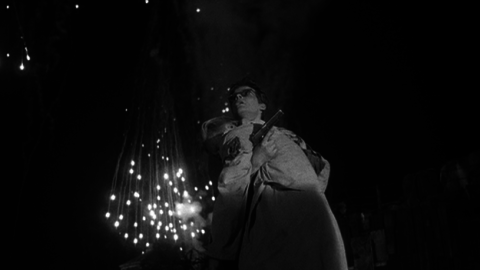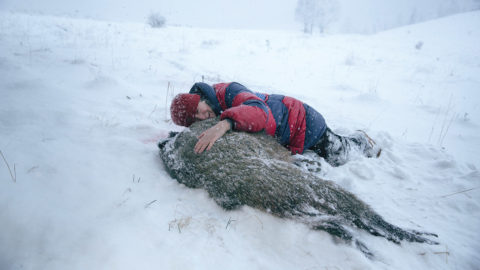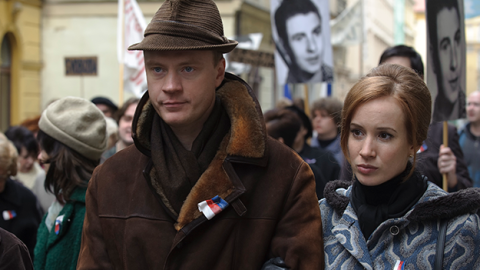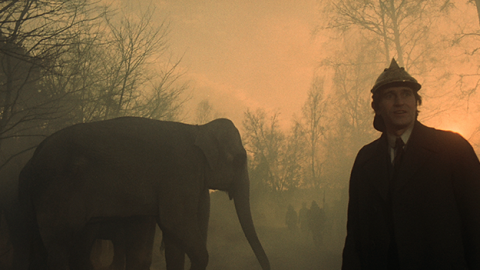Interview: Agnieszka Holland
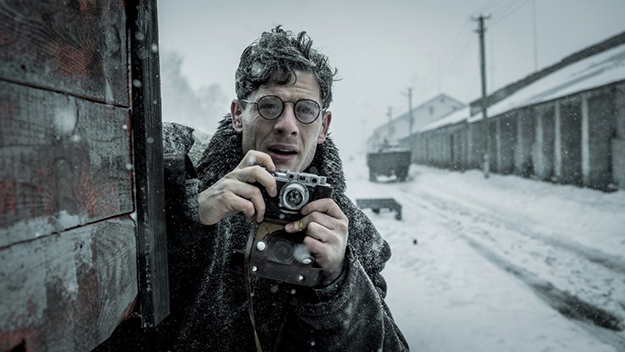
Images from Mr. Jones (Agnieszka Holland, 2019)
This article is part of a series of interviews conducted at the 2019 EnergaCAMERIMAGE International Film Festival in Toruń, Poland.
Few directors have a body of work as equally varied and consistent as Agnieszka Holland, whose career-long examination of the 20th century’s traumas culminates in her latest film, Mr. Jones. A highlight of the 2019 Berlinale, Mr. Jones stands out as one of the rare cinematic representations of the Holodomor, the Soviet regime’s deliberate starvation of millions of Ukrainians between 1932 and 1933. Rather than chronicling the famine through the victims’ eyes, screenwriter Andrea Chalupa and Holland take us on a gripping journey with Gareth Jones (James Norton), the 27-year-old Welsh investigative journalist who served as a foreign advisor to British Prime Minister Lloyd George and marked history by exposing the Holodomor at the cost of his own life.
I spoke with the Polish-born international filmmaker at this year’s EnergaCAMERIMAGE, where Mr. Jones was nominated for Best Cinematography.
You gave a speech at Washington’s National Gallery of Art in 2013 where you deplored the scarcity of Soviet-era narratives in cinema. Did making Mr. Jones ease your frustration about that gap in film history?
One of my main reasons for making this film was to remind people of Stalin’s crimes, which are practically forgotten and forgiven. I knew the story of the famine before receiving Andrea Chalupa’s script, but I wasn’t familiar with Gareth Jones—I had read about him in Timothy Snyder’s Bloodlands: Europe Between Hitler and Stalin, but didn’t remember. Andrea has Ukrainian origins, and her grandfather was an important survivor and witness of the Holodomor who had even testified in front of the United States Congress. So Andrea had known this story since childhood, and the fact that she’s a politically engaged journalist herself made her identify with Jones’s point of view.
The film’s first half feels like a thriller, while its second is more contemplative and really connects us with Jones as he makes his way through the starved and snow-covered Ukrainian countryside. Did you draw from Jones’s accounts of his trip to the Soviet Union to flesh out that sequence?
Jones’s notebook was found and published, but its content remains general, so some of the events in that sequence come from Andrea’s grandfather’s memories. Expressing a famine is quite difficult because it’s static, silent, and lonely—you don’t see the piles of bodies, since people are dying quietly and separately. The Holodomor’s most tragic aspect was that it was impossible to count its victims. Historians estimate a number between four and nine million, which is quite a big [interval] and means that the victims are not only voiceless but also nameless. With my cinematographer [Tomasz Naumiuk], we decided to treat the famine sequence in a minimalistic and silent way—there’s no music except for the orphans’ song composed by Antoni Lazarkiewicz and its lyrics were found in the archives. We wanted to show the Holodomor without showing too much and contrast the rhythm and motion of Jones’s journey [from London to the Soviet Union], which quotes Russian avant-garde cinema, with the dead stillness of Ukraine when he arrives there.
Was the episode with the orphaned siblings who resort to cannibalism to survive also something that Andrea’s grandfather had witnessed?
I don’t know if Andrea’s grandfather told her this particular story, but he spoke about cannibalism as a common thing during the Holodomor. It was shameful for survivors to talk about this, but historians have shown that it was a massive phenomenon and that people would turn to corpses when there was nothing left to eat. We wanted Gareth to participate in that experience, while depicting it in as discreet a way as possible.
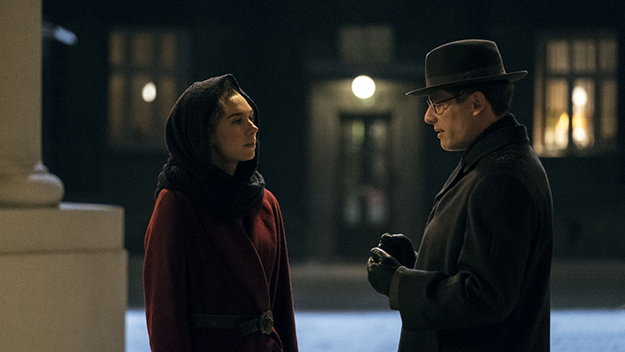
Mr. Jones’s psychological potency and epic dimension recall your previous feature, Spoor [2017]. Do you perceive a continuity between these two films despite their remote contexts?
I perceive a continuity between them like I perceive one through all my work. Mr. Jones is a rather classical historical film, while Spoor is just crazy and does not belong to a single genre. They have in common the fact that their main characters are fighters who don’t accept the status quo. What I like about Gareth Jones is that he’s a normal, well-educated, quiet rebel, who follows what he thinks is his duty, whereas Duszejko [Spoor’s protagonist] has a bigger-than-life personality and battles the whole system. He wants to tell the truth, while she wants to change the world.
What perhaps sets Mr. Jones apart from your other movies is its protagonist’s transparency. Jones retains his heroic purity throughout and never contradicts himself, unlike Europa Europa’s Solomon Perel [1990] or In Darkness’s Leopold Socha [2011], who have gray areas and are much harder to pin down.
Jones’s ability to see the mechanisms behind current events made him very wise, and he was much more intelligent and courageous than all the experienced politicians around him. He sensed exactly where Hitler was heading in 1933 and somehow discovered what was going on with Stalin’s five-year plan. It’s rumored that he may have worked as a spy for the British government at some point, but in the film, his path is simple and direct. Positive and sympathetic characters are not very fashionable nowadays, but we wanted to tell the story of a man who goes someplace by curiosity, comes across a terrible truth, and becomes prisoner of his duty as a messenger. In this respect, the film is also an homage to many journalists killed by [authoritarian] regimes in recent times, like Ján Kuciak in Slovakia.
Your films have a tendency to confine the viewer’s perspective through tight compositions and employ motifs such as reflections that bring Kieślowski’s work to mind. It seems to me that these are more than just stylistic devices and constitute a syntax that has grown out of the fractured and distorted reality of your youth spent under Communist rule.
You know, I don’t analyze myself that deeply, but the historical circumstances [of the Cold War] certainly influenced my filmmaking approach. For me, life without reflections is dull, and I see them as a way of giving metaphysical depth to a gray and unaesthetic reality. Kieślowski and I were close friends and helped each other out on practically every movie we made from the mid-’70s until his death [in 1996].
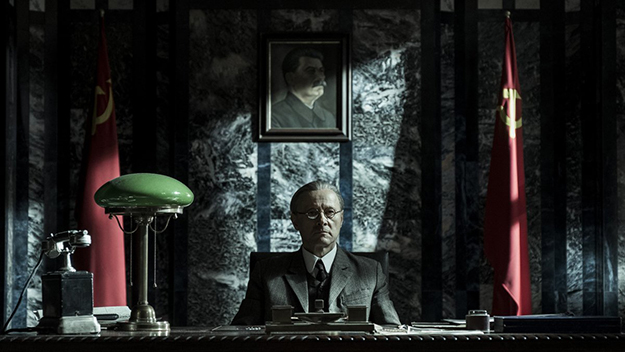
I was reminded of your own commitment to accessibility as a filmmaker when the George Orwell character explains his intentions with Animal Farm in Mr. Jones’s opening voice-over: “I wanted to tell a story that could be easily understood by anyone. Truth was too strange to tell any other way.” Would you consider Orwell as your surrogate in Mr. Jones?
Yes, it was important for me to have him in the film because he somehow represents my point of view—how to tell stories that are impossible to tell in times when people don’t want to listen to the truth. Orwell was an important figure in Communist countries when I was growing up. He was interested in metaphor rather than a documentary-like description of events, and the dystopias he imagined were very close to our reality. His presence in Mr. Jones comes from the fact that he was in the same circles as Gareth Jones and had probably met him. Also, after the end of the war, Andrea’s grandfather came upon a copy of Animal Farm in a displaced persons camp where he was a prisoner with other Ukrainians who didn’t want to go back to the Soviet Union. They read the book and were totally astonished by it, because they thought it was about them and their experience. So they translated it into Ukrainian and published it through a small company, which marked Animal Farm’s first translation into a foreign language.
Some people think that my films are explanatory, but I try to tell pluralistic stories that give the possibility of multiple interpretations. This became clear to me when I was doing Olivier, Olivier [1992], in which each family member, whether the mother, the daughter, or the lost son, accessed the house through a different entrance. And I thought this structure would allow the viewer to see the movie differently depending on their own sensibility, personal experience, or gender. But at the same time, I had to create a common space where everybody could meet and share the same emotion.
Does directing TV series allow you to further explore this idea of plurality?
Directing TV series was an instructive experience for me at first, but it became a destructive one after a while. Today, good writers prefer working in TV rather than movies, so you’ll find better and sharper writing there. But most series are conventional: the storytelling has to be efficient, and the dramaturgy is always the same—the end of the last act is intended to hook you into watching the next episode. And for me, [directing series] means losing the innocence you need to make films, a process in which you don’t know what tools you may discover along the way to move the story forward.
Yonca Talu is a filmmaker living in Paris. She grew up in Istanbul and graduated from NYU Tisch.



